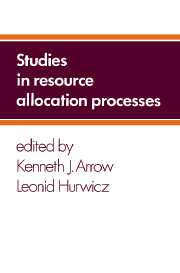Book contents
- Frontmatter
- Contents
- Preface
- Acknowledgments for reprinted articles
- PART I General introduction
- PART II Economies with a single maximand
- PART III Economies with multiple objectives
- 1 Stability of competitive-equilibrium
- 2 Competitive stability under weak gross substitutability
- 3 Stability in oligopoly
- 4 Studies in local stability
- 5 Dynamic shortages
- 6 Foundations of price dynamics
- PART IV General characterizations of allocation processes
- Appendix: An optimality criterion for decision-making under ignorance
- Author index
- Subject index
- Index of examples
5 - Dynamic shortages
Published online by Cambridge University Press: 04 April 2011
- Frontmatter
- Contents
- Preface
- Acknowledgments for reprinted articles
- PART I General introduction
- PART II Economies with a single maximand
- PART III Economies with multiple objectives
- 1 Stability of competitive-equilibrium
- 2 Competitive stability under weak gross substitutability
- 3 Stability in oligopoly
- 4 Studies in local stability
- 5 Dynamic shortages
- 6 Foundations of price dynamics
- PART IV General characterizations of allocation processes
- Appendix: An optimality criterion for decision-making under ignorance
- Author index
- Subject index
- Index of examples
Summary
The frequent and loud complaints of a shortage of engineers and scientists heard over the past eight years or so might be taken as indicating a failure of the price mechanism and indeed have frequently been joined with (rather vaguely stated) proposals for interference with market determination of numbers and allocation. It is our contention that these views stem from a misunderstanding of economic theory as well as from an exaggeration of the empirical evidence. On the contrary, a proper view of the workings of the market mechanism, recognizing, in particular, the dynamics of market adjustment to changed conditions, would show that the phenomenon of observed shortage in some degree is exactly what would be predicted by classical theory in the face of rapidly rising demands.
In this paper we present a model which explains the dynamics of the market adjustment process and apply the conclusions drawn from this analysis to the scientist-engineer “shortage.”
Equality of supply and demand is a central tenet of ordinary economic theory, but only as the end result of a process, not as a state holding at every instant of time. On the contrary, inequalities between supply and demand are usually regarded as an integral part of the process by which the price on a market reaches its equilibrium position. Price is assumed to rise when demand exceeds supply and to fall in the contrary case.
- Type
- Chapter
- Information
- Studies in Resource Allocation Processes , pp. 352 - 379Publisher: Cambridge University PressPrint publication year: 1977



